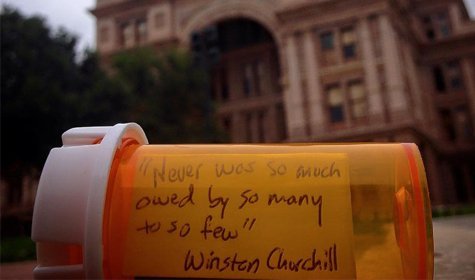AUSTIN — Texas veterans and their supporters gathered in front of the Vietnam Veterans Monument at the Texas State Capitol on Wednesday, Veterans Day, to announce the launch of a campaign advocating for comprehensive medical marijuana legislation.
Operation Trapped, backed by Texans for Responsible Marijuana Policy, is a veteran-based campaign to build support for legislation allowing access to medical marijuana — a safer alternative to prescription drugs — for treatment of post-traumatic stress disorder (PTSD), traumatic brain injury (TBI), chronic pain, and other service-related conditions. More information about Operation Trapped is available at http://www.texasmarijuanapolicy.org/operation-trapped.
“Veterans have sacrificed greatly to serve and protect our nation,” said David Bass of Killeen, a U.S. Army veteran who served in Operation Desert Storm and Operation Iraqi Freedom II. “It’s time to serve and protect the many soldiers who have returned home with debilitating conditions that would benefit greatly from medical marijuana. The goal of this campaign is to give those veterans a voice and get Texas legislators to listen.”
At the event, the campaign displayed several empty prescription pill bottles it has collected from supportive Texas veterans to represent those who are suffering from serious medical conditions that could be relieved by medical marijuana.
“Medical marijuana is oftentimes more effective and typically much safer than most prescription drugs,” said Clif Deuvall of Waco, a U.S. Air Force veteran who participated in Operation Frequent Wind and the historic Saigon Airlift in Vietnam. “It can ease the symptoms of PTSD and TBI and relieve chronic pain associated with service-related injuries.”
The Texas Legislature approved a flawed medical marijuana bill in May, and Gov. Greg Abbott signed it into law in June. SB 339 was intended to allow qualifying patients with intractable seizure conditions to access a marijuana extract containing high levels of cannabidiol, or CBD, and only trace levels of THC, but it is extremely unlikely to provide those patients with relief because it only allows doctors to “prescribe” marijuana to patients, which is prohibited under federal law. By contrast, the 23 states with comprehensive medical marijuana laws (and the District of Columbia) allow doctors to “recommend” medical marijuana or “certify” patients to use it. Unlike “prescriptions,” recommendations and certifications are federally legal and protected under the First Amendment.
The bill also only allows for extracts with very little THC, and some seizure patients say a greater ratio of THC to CBD is necessary for it to be effective in reducing the frequency and severity of seizures. The bill also fails to allow access to any medical marijuana products for people suffering from other debilitating conditions, such as PTSD, cancer, and multiple sclerosis, for which medical marijuana has been found to have significant medical benefits.
“The medical marijuana law that passed earlier this year is not going to help veterans and others who are suffering from these conditions,” said Kate Morgan of Lake Dallas, a U.S. Navy veteran. “The legislature needs to take action and ensure veterans have safe and legal access to whatever medical treatment works best for them.”

